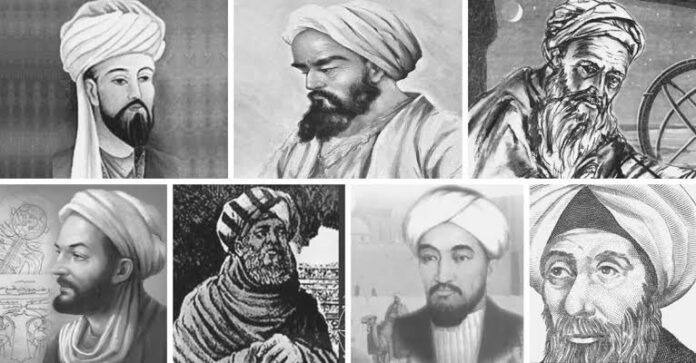Muslim Geniuses: 16 legends without whom modern science wouldn’t exist
Have you ever wondered where modern science began? While names like Einstein and Newton often dominate the spotlight, the truth is, centuries before their time, Muslim scientists laid the foundation for many of the discoveries that shape our world today.
During the Islamic Golden Age (8th–14th centuries), a wave of intellectual brilliance swept across the Muslim world, giving rise to remarkable minds whose innovations continue to influence us.
Here’s a captivating journey through the lives of 16 extraordinary Muslim scientists, without whom modern science might look very different.
1. Al-Khwarizmi (c. 780–850): The Genius Behind Algorithms
Ever heard of algorithms? The technology that powers our phones, computers, and artificial intelligence traces back to Al-Khwarizmi, the “Father of Algebra.” Living in 9th-century Baghdad, he introduced algebraic concepts and methods that changed mathematics forever. His name lives on in the term “algorithm.”
2. Ibn Sina (980–1037): The Doctor of All Doctors
Known in the West as Avicenna, Ibn Sina’s Canon of Medicine was the ultimate medical guide for over 600 years. Beyond medicine, he was a philosopher and astronomer, creating knowledge that bridged disciplines and inspired the Renaissance.
3. Alhazen (965–1040): Master of Optics
How do we see the world around us? Ibn al-Haytham, or Alhazen, answered this by explaining how light interacts with the eye. His Book of Optics wasn’t just revolutionary; it laid the foundation for modern cameras and lenses.
4. Al-Razi (865–925): The Pioneer of Medicine
Known as Rhazes in Europe, Al-Razi was a fearless researcher. From discovering ethanol to distinguishing smallpox from measles, his medical writings transformed healthcare. His work remains a cornerstone in medical history.
5. Jabir Ibn Hayyan (c. 721–815): The Father of Chemistry
Jabir wasn’t just a chemist; he was the chemist. He invented laboratory techniques and discovered acids like nitric acid, shaping modern chemical science. Today, we owe much of our experimental practices to his brilliance.
6. Al-Biruni (973–1048): The Universal Thinker
Al-Biruni was the kind of mind that could calculate the Earth’s circumference with mind-boggling accuracy—without modern tools. His astronomical insights and geographic measurements remain a marvel.
7. Omar Khayyam (1048–1131): Poet and Mathematician
While you may know him for his timeless poetry, Omar Khayyam was also a revolutionary mathematician. He solved cubic equations and improved calendar systems, merging art and science seamlessly.
8. Ibn Khaldun (1332–1406): The Father of Sociology
How do societies grow, rise, and fall? Ibn Khaldun’s Muqaddimah provided answers, making him the “Father of Sociology.” His work is still relevant in understanding political and social dynamics today.
READ ALSO: 10 most beautiful Mosques around the world
9. Ibn Battuta (1304–1369): The World’s Greatest Traveller
Ibn Battuta’s epic journeys took him across 44 modern countries. His detailed travelogues introduced the world to distant cultures, blending geography, science, and storytelling.
10. Nasir al-Din al-Tusi (1201–1274): The Astronomical Visionary
Al-Tusi’s trigonometric breakthroughs and astronomical observations reshaped our understanding of the cosmos. His work even influenced Copernicus, centuries later.
11. Al-Zahrawi (936–1013): The Surgeon Extraordinaire
Meet the “Father of Modern Surgery.” Al-Zahrawi introduced over 200 surgical tools and techniques. From sutures to scalpels, his innovations are still saving lives.
12. Al-Kindi (c. 801–873): The Philosopher of Numbers
Al-Kindi merged philosophy, mathematics, and science in ways that shaped early Islamic thought. He introduced the Indian numeral system to the Arab world, paving the way for the numbers we use today.
13. Ibn al-Nafis (1213–1288): The Heart Specialist
Centuries before William Harvey, Ibn al-Nafis described pulmonary circulation, detailing how blood flows between the heart and lungs. His groundbreaking discoveries redefined medical science.
14. Mariam al-Asturlabi (10th Century): The Star Mapper
Mariam, a 10th-century woman scientist, designed intricate astrolabes for navigation and astronomy. Her contributions not only helped sailors but also inspired generations of female scientists.
15. Al-Farabi (872–950): The Second Teacher
Philosopher, logician, and musician, Al-Farabi was known as the “Second Teacher” after Aristotle. His synthesis of Greek and Islamic ideas made him a giant of intellectual history.
16. Ibn Rushd (1126–1198): The Bridge Between Worlds
Known as Averroes in the West, Ibn Rushd’s philosophical commentaries brought Greek thought to Europe. His influence helped spark the Renaissance, proving the power of knowledge across cultures.
Their Legacy: A Bridge to the Future
These 16 scientists didn’t just shape their own time; they shaped ours. Their work was a bridge between ancient wisdom and modern innovation, proving that knowledge knows no boundaries.
Whenever you marvel at a smartphone, a satellite, or a surgical robot, remember the brilliant minds who laid the foundation. These Muslim scientists remind us that curiosity, determination, and creativity can indeed change the world.
Let their stories inspire you—time and time again.
Written by Sakinat Musa Abubakar, Editor at Neptune Prime.
Follow the Neptune Prime channel on WhatsApp:
Do you have breaking news, interview request, opinion, suggestion, or want your event covered? Email us at neptuneprime2233@gmail.com





